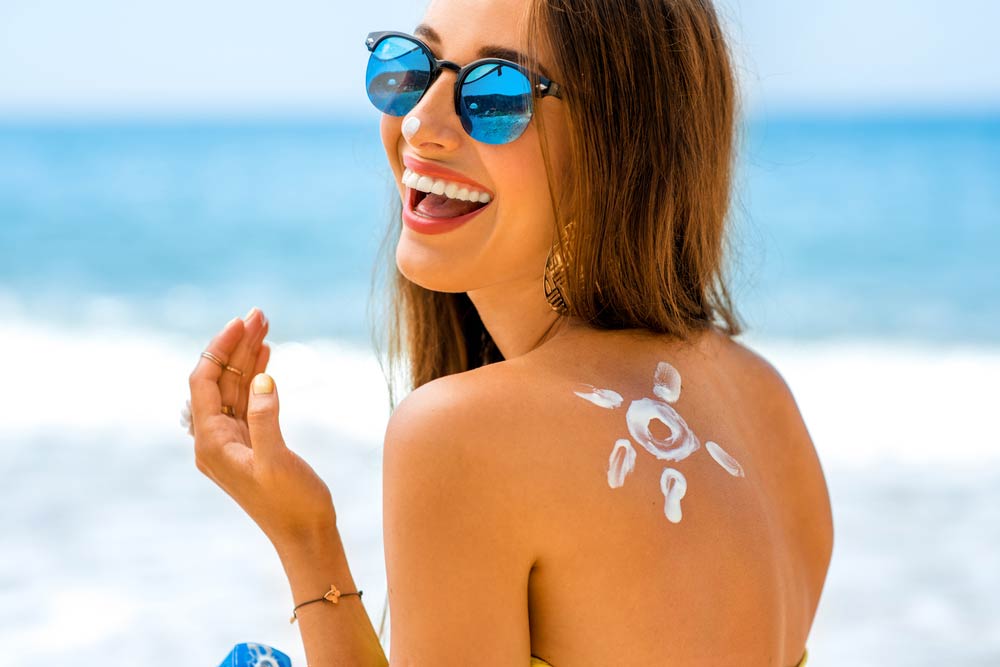
Exposure to the sun's damaging rays can be harmful to your skin, so to help you stay safe from the Australian sun, we've sourced invaluable sunscreen tips from Aussie dermatologists. From choosing the right sunscreen to applying it correctly, we’ve got the tips you need to keep your skin safe in the sun.
1. Broad-Spectrum Is Best
First and foremost, always opt for a 'broad-spectrum' sunscreen. Broad-spectrum sunscreens protect you from both UVA and UVB rays. These two forms of ultraviolet radiation have different wavelengths. UVA rays have the longer rays although less intense, they can penetrate glass and clouds, contributing to skin ageing and wrinkling. UVB rays, on the other hand, have shorter wavelengths but are more potent and are responsible for causing sunburn. Note that zinc oxide sunscreens are systematically broad-spectrum due to the physical nature of zinc particles that reflect all harmful rays – including blue light!
2. Don't Skimp On Sunscreen
When it comes to applying sunscreen, be generous. Dermatologists recommend one teaspoon per area of your body – one per leg, one per arm, one for the front of your body, one for your back and one for your head. This means a full body application for an adult should be at least 35mL or seven teaspoons. Under-application can dramatically decrease the effectiveness of the sunscreen, leaving you vulnerable.
3. Be An Early Bird
Sunscreen isn't instantaneously effective, and that is particularly the case for chemical formulations. It requires around 15 to 20 minutes to sink into your skin and start working. Applying it just before exposure to the sun isn't enough. A mineral sunscreen will start protecting you as soon as it is applied but it is best to let it settle on the skin if you are toping it up with make-up. Incorporate it into your morning routine, whether you're heading out or working near windows at home or the office.
4. Reapply, Reapply, Reapply
Your sun protection strategy shouldn't be a one-and-done deal. It's essential to reapply sunscreen every two hours and immediately after exercising or swimming, as these can wash away the product. Even if a sunscreen is water-resistant, it only stays effective for about 40 to 80 minutes when you're in the water.
5. Understanding SPF
While a higher Sun Protection Factor (SPF) offers more protection, it's not as much as you might believe. A sunscreen with SPF 30 blocks about 97% of UVB rays, while one with SPF 50 blocks around 98%. The percentage doesn't increase proportionately with the SPF number, so don't get tricked into a false sense of security with extremely high SPFs.
6. Embrace Sunscreen Every Day
You might think that sunscreen is unnecessary in winter or on overcast days, but you do! Up to 80% of UV radiation can penetrate light cloud cover. Hence, it's important to incorporate sunscreen into your daily skincare routine, regardless of the weather or season. If you’re sitting at the office, working on a screen, remember you are getting beneficial blue light protection if wearing a mineral SPF.
7. Cover Up And Seek Shade
Sunscreen is vital, but it's not your only defence against harmful UV rays. Seek shade whenever possible, especially during peak UV radiation times, usually between 10 am and 4 pm. Also, consider clothing with a UPF (Ultraviolet Protection Factor) rating, wide-brimmed hats and UV-blocking sunglasses. These can provide physical barriers against the sun's rays.
8. Don't Ignore Hard-To-Reach Areas
Certain areas of your body can often be overlooked when applying sunscreen but are just as susceptible to sun damage. These include your ears, the back of your neck, your scalp (especially if you have thinning hair) and the tops of your feet. Ask for assistance to ensure these hard-to-reach areas are well protected.
9. Be Mindful Of Certain Medications
Some medicines, including certain antibiotics, retinoids and anti-inflammatories, can make your skin more sensitive to sunlight. This phenomenon is known as photosensitivity. If you're on such medication, it's vital to take extra precautions. Apply generous amounts of sunscreen, limit your sun exposure and wear protective clothing.
10. Don't Rely On Cosmetics With SPF Alone
While it's beneficial to use a foundation or moisturiser with added SPF, it should not be your only line of defence. Most people do not apply cosmetics as thoroughly or as frequently as sunscreen, leaving parts of your skin exposed.
Protect Your Skin (And More) With People4Ocean
Now that you're equipped with the best sunscreen tips from the experts, it is important to know that many sunscreens contain varying types of chemicals that enter waterways and ocean, with long-term impacts on marine species such as dolphins, turtles, reef fishes and corals.
We at People4Ocean have made it our mission to provide the safest, most effective range of sun protection while carefully choosing ingredients to ensure zero toxicity for people and oceans.


Comments (0)
Back to Blog